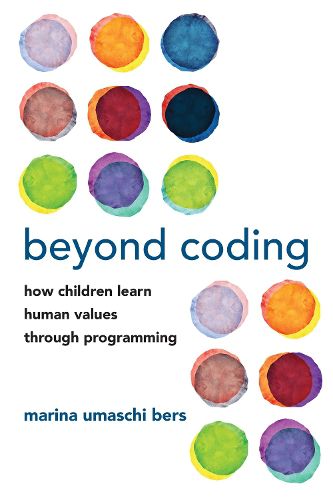Readings Newsletter
Become a Readings Member to make your shopping experience even easier.
Sign in or sign up for free!
You’re not far away from qualifying for FREE standard shipping within Australia
You’ve qualified for FREE standard shipping within Australia
The cart is loading…






Why children should be taught coding not as a technical skill but as a new literacy-a way to express themselves and engage with the world.
Today, schools are introducing STEM education and robotics to children in ever-lower grades. In Beyond Coding, Marina Umaschi Bers lays out a pedagogical roadmap for teaching code that encompasses the cultivation of character along with technical knowledge and skills. Presenting code as a universal language, she shows how children discover new ways of thinking, relating, and behaving through creative coding activities. Today’s children will undoubtedly have the technical knowledge to change the world. But cultivating strength of character, socioeconomic maturity, and a moral compass alongside that knowledge, says Bers, is crucial.
Bers, a leading proponent of teaching computational thinking and coding as early as preschool and kindergarten, presents examples of children and teachers using the Scratch Jr. and Kibo robotics platforms to make explicit some of the positive values implicit in the process of learning computer science. If we are to do right by our children, our approach to coding must incorporate the elements of a moral education- the use of narrative to explore identity and values, the development of logical thinking to think critically and solve technical and ethical problems, and experiences in the community to enable personal relationships. Through learning the language of programming, says Bers, it is possible for diverse cultural and religious groups to find points of connection, put assumptions and stereotypes behind them, and work together toward a common goal.
$9.00 standard shipping within Australia
FREE standard shipping within Australia for orders over $100.00
Express & International shipping calculated at checkout
Stock availability can be subject to change without notice. We recommend calling the shop or contacting our online team to check availability of low stock items. Please see our Shopping Online page for more details.
Why children should be taught coding not as a technical skill but as a new literacy-a way to express themselves and engage with the world.
Today, schools are introducing STEM education and robotics to children in ever-lower grades. In Beyond Coding, Marina Umaschi Bers lays out a pedagogical roadmap for teaching code that encompasses the cultivation of character along with technical knowledge and skills. Presenting code as a universal language, she shows how children discover new ways of thinking, relating, and behaving through creative coding activities. Today’s children will undoubtedly have the technical knowledge to change the world. But cultivating strength of character, socioeconomic maturity, and a moral compass alongside that knowledge, says Bers, is crucial.
Bers, a leading proponent of teaching computational thinking and coding as early as preschool and kindergarten, presents examples of children and teachers using the Scratch Jr. and Kibo robotics platforms to make explicit some of the positive values implicit in the process of learning computer science. If we are to do right by our children, our approach to coding must incorporate the elements of a moral education- the use of narrative to explore identity and values, the development of logical thinking to think critically and solve technical and ethical problems, and experiences in the community to enable personal relationships. Through learning the language of programming, says Bers, it is possible for diverse cultural and religious groups to find points of connection, put assumptions and stereotypes behind them, and work together toward a common goal.